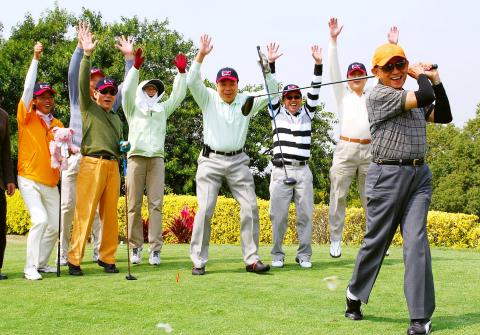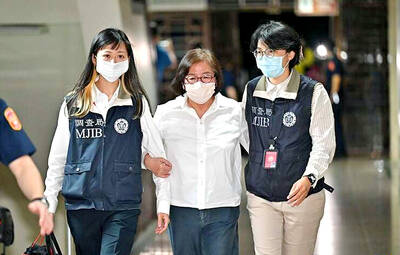The Ministry of Foreign Affairs (MOFA) yesterday welcomed a preliminary investigation by the Philippine government that questioned the legality of deporting 14 Taiwanese suspects to China last month, a move that had sparked a diplomatic row between Taipei and Manila.
What the investigation found wrong with the Philippine government’s handling of the case was “as expected,” MOFA Deputy Spokesman Steve Shia (夏季昌) said, adding that the ministry was still waiting for a formal investigation and an apology for the deportation.
In December, the Philippines’ National Bureau of Investigation (NBI) arrested the 14 Taiwanese along with 10 Chinese in two separate areas: one in Bel Air Village in Makati City, and another one in Ayala Alabang Village in Muntinlupa City, and deported the suspects to China.

Photo: CNA
The suspects were arrested in connection with a -multimillion--dollar crime ring that used the Internet and telecommunications devices to swindle Chinese nationals.
During the raids, automated teller machine cards, laptops, printers, cellphones, telephone and computer cables, routers, adapters, radios and a satellite transceiver were confiscated.
“We have already pointed out long ago the mistakes [the Philippine authorities] made in the case,” Shia said, in response to Philippine media reports about four separate resolutions on the case dated Feb. 21 and issued by an investigation prosecutor of the Philippine Department of Justice.
According to Philippine media, Investigating Prosecutor Gerard Gaerlan, assigned by Justice Secretary Leila de Lima to handle the preliminary investigation of the case, recommended the dismissal of the criminal case against the 24 foreigners filed by the NBI and the Chinese embassy.
Gaerlan said there was no sufficient evidence to file charges against them for fraud or violation of the Access Devices Regulations Act of 1998 or Republic Act No. 8484 (R.A. 8484).
In his findings, Gaerlan said that the seized items “cannot immediately be classified as access devices defined under R.A. 8484 since the items were ordinary equipment used for ordinary activities.”
“Thus, failure to show any proof that these seized items were used in committing prohibited acts -under R.A. 8484 means that there is not enough evidence to establish probable cause against the respondents, since the mere possession of these items is not prohibited by the said law,” he added.
Gaerlan ruled that the arrest of nine of the 14 deported Taiwanese was unlawful because the warrant used by the NBI to search their rented apartment in Makati City was invalid as it indicated not the particular place to be searched, but only the whole street where numerous houses are found.
“In view of the fact that the place indicated in the subject search warrant failed to specify a definite place to be searched, the same became a general warrant, which is strictly prohibited by the Constitution,” Gaerlan said.
In his resolution on those who were arrested in the Makati raid, Gaerlan cited the “fruit of the poisonous tree” doctrine and said that the arrests of the suspects in Makati were unlawful because the search warrant against them “was null and void from the very beginning.”
Meanwhile, visiting former Philippine president Fidel Ramos said yesterday that Taiwan and the Philippines should work together to enhance bilateral relations and should not let their cordial relations deteriorate.
Ramos, who arrived in Taiwan on Thursday for a five-day visit, was responding to questions about his views on the diplomatic row between Taipei and Manila over the deportation.
Speaking to reporters on the sidelines of a golf tournament in Changhua County, Ramos said the incident should not be allowed to affect the friendly ties between the two sides.
The Philippines maintains close relations with Taiwan and other neighboring countries, he said. There are many Taiwanese running businesses in the Philippines, and there are a lot of Filipinos working in Taiwan, he said, adding that the two countries should work to upgrade bilateral ties and try to live harmoniously.
Taiwan, the Philippines and China are all influenced by Confucian culture, Ramos said, adding that if all three could cooperate, they could achieve prosperity.
Ramos said on Thursday that his visit was not about resolving the diplomatic row between Taipei and Manila, but rather was focused on sports and trade.

Costa Rica sent a group of intelligence officials to Taiwan for a short-term training program, the first time the Central American country has done so since the countries ended official diplomatic relations in 2007, a Costa Rican media outlet reported last week. Five officials from the Costa Rican Directorate of Intelligence and Security last month spent 23 days in Taipei undergoing a series of training sessions focused on national security, La Nacion reported on Friday, quoting unnamed sources. The Costa Rican government has not confirmed the report. The Chinese embassy in Costa Rica protested the news, saying in a statement issued the same

Taiwan is to extend its visa-waiver program for Philippine passport holders for another year, starting on Aug. 1, Minister of Foreign Affairs Lin Chia-lung (林佳龍) said on Friday. Lin made the announcement during a reception in Taipei marking the 127th anniversary of Philippine independence and the 50th anniversary of the establishment of the Manila Economic and Cultural Office (MECO) in Taiwan, the Ministry of Foreign Affairs said. The decision reflected Taiwan’s commitment to deepening exchanges with the Philippines, the statement cited Lin as saying, adding that it was a key partner under the New Southbound Policy launched in 2016. Lin also expressed hope

Temperatures in New Taipei City’s Sindian District (新店) climbed past 37°C yesterday, as the Central Weather Administration (CWA) issued heat alerts for 16 municipalities, warning the public of intense heat expected across Taiwan. The hottest location in Taiwan was in Sindian, where the mercury reached 37.5°C at about 2pm, according to CWA data. Taipei’s Shilin District (士林) recorded a temperature of 37.4°C at noon, Taitung County’s Jinfeng Township (金峰) at 12:50 pm logged a temperature of 37.4°C and Miaoli County’s Toufen Township (頭份) reached 36.7°C at 11:40am, the CWA said. The weather agency yesterday issued a yellow level information notice for Taipei, New

CASE: Prosecutors have requested heavy sentences, citing a lack of remorse and the defendants’ role in ‘undermining the country’s democratic foundations’ Five people affiliated with the Chinese Nationalist Party (KMT), including senior staff from the party’s Taipei branch, were indicted yesterday for allegedly forging thousands of signatures to recall two Democratic Progressive Party (DPP) lawmakers. Those indicted include KMT Taipei chapter director Huang Lu Chin-ru (黃呂錦茹), secretary-general Chu Wen-ching (初文卿) and secretary Yao Fu-wen (姚富文), the Taipei District Prosecutors’ Office said in a news release. Prosecutors said the three were responsible for fabricating 5,211 signature forms — 2,537 related to the recall of DPP Legislator Wu Pei-yi (吳沛憶) and 2,674 for DPP Legislator Rosalia Wu (吳思瑤) — with forged entries accounting for